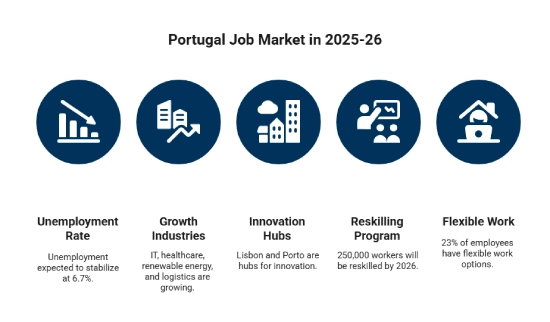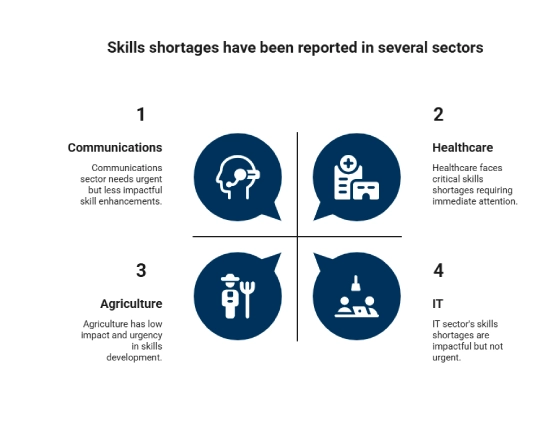Portugal Job Market in 2025-30
Portugal's job market is changing quickly and offers chances for workers in many fields. The country's focus on tech, keeping things sustainable and growing the economy is making more people needed in important job areas. Key highlights are:
- Unemployment is forecast to stabilize at 6.7% in 2025
- Top growth industries: IT, healthcare, renewable energy, and logistics
- Lisbon and Porto remain hubs for innovation and skilled talent
- 250,000 workers set to be reskilled under government programs by 2026
- 23% of employees now enjoy flexible and remote work options

Job Outlook in Portugal
Portugal's economy is growing at a steady pace, with changes in digital technology and eco-friendly projects leading the way. Companies are looking for skilled workers in new technologies, clean energy, and healthcare. Job seekers should consider exploring opportunities in this strong and progressive job market.
Understanding the Job Outlook for Job Seekers and Employers
Portuguese employers are having a hard time finding people to work in important areas like communication tech, IT, business support, healthcare, hotels, farming, building, and green energy.
If you're a skilled worker from another country looking to live and work in Portugal, these fields are a good bet. If you have skills in these areas, it's easier to get a work permit, and companies here really want people with these skills because they don't have enough workers.
General Employment Trends for the Year
Workers now care more about balancing their jobs with their personal lives, and many companies have switched to remote or hybrid work. Because these changes have stuck around in many fields, the government has made rules to support flexible work options throughout the country.
Factors Influencing Job Creation or Reduction
Portugal's job market has bounced back after the pandemic. The jobless rate is still low, and there are plenty of open jobs—about 1.4% of the working population. This shows that jobs are being created, and that many industries still need qualified workers.
In-Demand Industries and Occupations
Analysis of Industries Experiencing Growth and Increased Demand for Skilled Workers
The shift to digital technology is creating a high need for new skills in all job fields. Besides basic computer knowledge, skills like critical thinking and data interpretation are expected to be very important in the next ten years. Still, many people aren't ready: about 27% of people have few or no digital skills, and this problem is bigger, over 33%, for those without a job.
Older people also face longer periods of unemployment. In 2021, 27% of jobless people between 15 and 29 years old had been unemployed for more than a year. This number jumped to 53% for those between 45 and 49, and even higher, 59%, for those 50 and older. This suggests that it's really important for Portuguese workers to keep learning new skills throughout their careers.
Discussion on specific occupations in demand
Here's a list of the most sought-after jobs that need skilled workers, along with their average yearly salaries:
|
Occupation |
Average annual salary |
|
IT and Software |
€ 30,000 |
|
Engineering |
€ 28,174 |
|
Accounting and Finance |
€ 25,500 |
|
Human Resource Management |
€ 30,000 |
|
Hospitality |
€ 24,000 |
|
Sales and Marketing |
€ 19,162 |
|
Healthcare |
€ 19,800 |
|
STEM |
€ 38,000 |
|
Teaching |
€ 24,000 |
|
Nursing |
€ 25,350 |
.webp)
Workforce demands in different States of Portugal
Highlighting Areas with Notable Job Opportunities or Challenges
Tourism is still really important for Portugal's economy. It has a lot of part-time and seasonal jobs, mostly in areas like hospitality, food service, and hotels. Also, there are way more call centers now, so people who speak more than one language have a good chance of finding work. The car, building, and repair industries are also growing at a steady pace. This shows that the country's economy is getting better and that there's a need for more infrastructure.
Skills shortages have been reported in several sectors including:
- Communications
- IT
- Healthcare
- Tourism and hospitality
- Agriculture

Impact of Technology and Automation
The job market is changing because of automation and AI. Some manual jobs are going away, but there's more need for skilled tech and renewable energy workers. To do well, people must learn new skills.
Discussion on How Technological Advancements and Automation Are Shaping the Job Market
In Portugal, building personal relationships is very important in business, and this affects how people work. A lot of businesses are still run by families, which shows how key family is to the country's businesses.
Portuguese companies, particularly the smaller ones, usually have flatter structures than those in northern and central Europe. Meetings tend to be more casual and personal than people from places like the UK or Germany might think. Usually, top executives handle the main decisions. Long business lunches are common and are sometimes held at a partner's house to build trust and teamwork.
Potential Opportunities and Challenges for Workers in the Evolving Landscape
Portuguese employers are facing hiring difficulties in important areas like tech, hospitality, construction, healthcare, farming, business support, and renewable energy. These shortages mean good opportunities for skilled workers. They also show that workforce training and skills improvement programs are needed.
Skills in Demand in Portugal
Identification of Key Skills Sought by Employers
For job seekers hoping to do well in Portugal's job market, it's important to know what skills employers want. Besides technical skills, many fields value soft skills such as teamwork, being able to change, and problem-solving. These show that a person can work well with others, handle changes easily, and help the company succeed.
Importance of Upskilling or Reskilling for Job Seekers
For professionals looking to get ahead, investing in upskilling or reskilling is essential. Gaining new skills not only increases how much you can earn but also ensures you can find work in a job market that is quickly changing. By building skills that are relevant, people can be more competitive and grab new chances in Portugal’s growing fields.
Remote Work and Flexible Arrangements
Exploration of the Continuing Trend of Remote Work
Remote work has become an established feature of Portugal’s employment landscape, offering clear benefits for both employees and employers. Initially accelerated by the COVID-19 pandemic, this shift enabled many organisations to transition from traditional office-based setups to fully remote or hybrid work models, prioritising safety and operational continuity. Today, flexible work arrangements remain highly valued across multiple sectors.
Implications for Both Employers and Employees
Employers should clearly state key job details upfront. This includes pay, work hours, time off, and where the work will take place. Employees find that working remotely makes balancing life and work easier. Employers can also hire from a larger group of people and keep workers longer because of remote work.
Government Policies and Initiatives
Overview of Government Programs or Policies Influencing Employment
Portugal's joblessness rate is among the lowest in Europe, about 6%, which is close to the EU's average. This looks good next to Spain, where 12% of people are jobless.
A few things help Portugal's job market. The government put money into creating jobs, especially in tech, new ideas, and helping new businesses. Also, the country has good tax rules for companies and gives rewards to those who hire, bringing international businesses to Portugal.
Tourism is also a big job source, with around 10% of workers in that area. Even when things got tough around the world, Portugal worked to keep jobs steady, so it can keep growing chances for workers.
Analysis of How Policy Changes May Impact the Job Market
Salary changes in Portugal show how much workers are wanted and available. Salaries usually go up when companies want more workers than what's available. Higher salaries are good for workers, but they might make it more expensive for companies to hire, which could slow down hiring. Still, this balance helps keep the job market steady and helps the economy in the long run.
Challenges and Opportunities for Job Seekers in Portugal
Discussion on the Challenges Faced by Job Seekers
Portugal's tech industry is growing, drawing talent from different countries, and a lot of businesses are looking for workers from other places. But, if you are looking to work in older industries, it can be tough if you don't know Portuguese. This splits the job market; it is easier to find work if you know Portuguese or other languages instead of only knowing English.
Because there's a lot of competition for jobs, people from the EU and EEA should start looking for work as soon as they can to get the jobs they want. People from outside the EU need to have a job offer before they move to Portugal, which is needed to get a work visa.
Tips and Strategies for Navigating the Job Market Successfully
To get noticed in Portugal's tough job scene, it's important to create a solid CV. Often, your CV is how employers first see you, so make sure to put your best skills, qualifications, and work history near the beginning. Show off any certifications, degrees, or special training to prove what you know.
Change your CV for each job you apply for by matching it to what they're looking for, focusing on achievements and projects that matter. Keep it short, organized, and without mistakes. Use bullet points to list your duties and successes clearly. A good summary at the start can quickly grab an employer's interest and shape how they view your application.
Summary of Portugal Job Outlook
It's important to know the job market and work culture if you're thinking about working in Portugal. Portuguese companies are growing at a good rate, and they value experience and how long someone has worked somewhere. In their business culture, it is a point to creating solid and lasting connections with clients, suppliers, and partners.
People there prefer in-person meetings to emails or calls, which shows how important personal relationships are at work. Usually, people work 40 hours a week over five days, with offices open from 9 a.m. to 6 p.m. If you keep your expectations realistic and get used to these cultural details, you'll fit into the Portuguese workforce without trouble.
Looking for Inspiration
Explore what Global Citizens have to say about Y-Axis in shaping their future
Frequently Asked Questions
